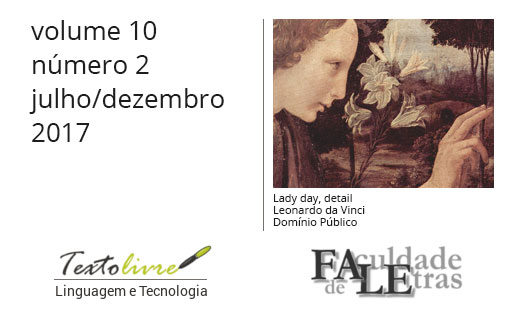Anna Karenina no cinema: o primeiro encontro de Anna e Vronski nos filmes de 1935, 1948 e 2012
DOI :
https://doi.org/10.17851/1983-3652.10.2.254-270Mots-clés :
Anna Karenina, adaptações, cinema, literatura, pesquisa.Résumé
RESUMO: Este estudo surgiu da participação no grupo de pesquisa intitulado Literatura em Diálogo, que tem como objetivo o estudo e a pesquisa sobre as diversas adaptações cinematográficas do romance Anna Karenina, de Leon Tolstói. Neste estudo, em particular, é feita uma análise da primeira cena de encontro entre Anna Karenina e Alexei Vronski, nas adaptações cinematográficas de 1935 (Clarence Brown), 1948 (Julien Duvivier) e 2012 (Joe Wright), e no texto literário de Tolstói (1877). A apropriação do texto literário pelo cinema fez com que os olhares de teóricos de ambas as artes se voltassem para a relação entre elas. Sendo assim, há diversos conceitos a serem analisados e articulados, entre eles: fidelidade, tradução, elementos fílmicos e intertextualidade. Nesta pesquisa, investiga-se o material literário, sua recriação cinematográfica e as múltiplas possibilidades que surgem dessa relação de linguagens artísticas diferentes e com particularidades específicas. Dentro das próprias produções fílmicas serão apontadas, ao longo do artigo, as diferentes formas de realizar adaptações, que carregam as ideologias do seu realizador, condições de realização e contextos históricos diferentes. A perspectiva teórica que norteia esta pesquisa é a literária em conjunto com a cinematográfica, segundo os estudos de Stam (2006), Pereira (2009), Hutcheon (2011) e outros. Em outras palavras, investiga-se qual(is) representação(ções) pode(m) ser percebida(s) nessas adaptações fílmicas feitas através da apropriação do texto. Pretende-se observar não somente o deslocamento do literário para a obra cinematográfica, mas também as diferentes formas de se fazer a adaptação dentro das próprias produções para a tela do material ficcional, pois não existe uma única maneira de produzir adaptações.
PALAVRAS-CHAVE: Anna Karenina; adaptações; cinema; literatura; pesquisa.
ABSTRACT: The origin of this study is the participation in the research group Literature and Dialogue, that seeks to study and research the many filmic adaptations of the novel Anna Karenina, by Leon Tolstoi. In this particular study, an analysis of the first encounter between Anna Karenina and Alexei Vronski was conducted, as it was portrayed in the filmic adaptations from 1935 (Clarence Brown), 1948 (Julien Duvivier) and 2012 (Joe Wright), as well as in the literary text by Tolstoy (1877). The appropriation of the literary text by the cinema made the theoreticians from both fields turn their attention towards the the relationship between them: fidelity, translation, filmic elements and intertextuality. In this research, the literary material was investigated, as well as its filmic recreations and the multiple possibilities that come from the relationship between different artistic languages with specific particularities. Within the filmic productions themselves, throughout the article, different ways to conduct adaptations are going to be pointed at, as they carry the ideologies of their auteurs, the conditions in which they were produced and their different historical contexts. This study was informed by literary and cinematographic theoretical perspectives, according to the studies of Stam (2006), Pereira (2009), Hutcheon (2011) and others. In other words, this study investigates which representations may be found in the filmic adaptations conducted through the appropriation of the text. The study aims not only at looking at the movement from literature to cinematographic work, but also at the different ways to conduct an adaptation within the productions of the fictional material for the screen, since there are many possible ways to produce adaptations.
KEYWORDS: Anna Karenina; adaptations; cinema; literature; research.
Téléchargements
Références
AMERICAN FILM ASSOCIATION. Afi's 50 Greatest American Screen Legends. 1999. Disponível em: http://www.afi.com/100Years/stars.aspx. Acesso em: 24 jul. 2017.
ANNA Karenina. Direção: Clarence Brown. Produção: David O. Selznick. Estados Unidos: Metro-Goldwyn-Mayer, 1935.
ANNA Karenina. Direção: Julien Duvivier. Produção: Alexander Korda; Herbert Mason. Reino Unido: British Lion Films & London Films, 1948.
ANNA Karenina. Direção: Joe Wright. Produção: Tim Bevan; Eric Fellner; Paul Webster. Reino Unido: Focus Features, 2012.
BAZIN, A. O Cinema: ensaios. São Paulo: Brasiliense, 1991.
BRITO, J. B. Literatura no cinema. São Paulo: Unimarco, 2006.
HUTCHEON, L. Uma teoria da adaptação. Florianópolis: Ed. da UFSC, 2011.
MORAIS, C. F. de. Anna Karenina: da página à tela. XlV ABRALIC, 2014.
PEREIRA, O. A. Cinema e Literatura: dois sistemas semióticos distintos. Kalíope. Revista do Programa de Estudos Pós-Graduados em Literatura e Crítica Literária. PUC-SP,, ano 5, n. 10, p. 70-79, ago./dez. 2009. Disponível em: https://revistas.pucsp.br/index.php/kaliope/article/view/7471/5455. Acesso em: 26 nov. 2017.
SCHLÖGL, L. O diálogo entre o cinema e a literatura: reflexões sobre as adaptações na história do cinema. VIII Encontro nacional de história da mídia. Unicentro, Guarapuava-PR, 2011. Anais… Guarapuava, 2011. Disponível em: http://www.educadores.diaadia.pr.gov.br/arquivos/File/setembro2012/portugues_artigos/dialogo.pdf. Acesso em: 26 nov. 2017.
STAM, R. Teoria e prática da adaptação: da fidelidade à intertextualidade. Ilha do Desterro – A Journal of English Language, Literatures in English and Cultural Studies, 51, p. 19-53, 2006.
STAM, R. A literatura através do cinema: realismo, magia e a arte da adaptação. Belo Horizonte: Ed. UFMG, 2008.
STAM, R. Introdução à teoria do cinema. Campinas: Papirus, 2009.
TOLSTÓI, L. Anna Karênina. São Paulo: Editora Nova Cultural, 2002.
WOOLF, V. The cinema. In: WOOLF, V. The captain’s death bed and other essays. London: The Hogarth Press, 1950.
Téléchargements
Publiée
Numéro
Rubrique
Licence
(c) Copyright Texto Livre: Linguagem e Tecnologia 2017

Ce travail est disponible sous la licence Creative Commons Attribution 4.0 International .
Il s'agit d'un article en libre accès qui permet une utilisation, une distribution et une reproduction sans restriction sur n'importe quel support tant que l'article original est correctement cité.











